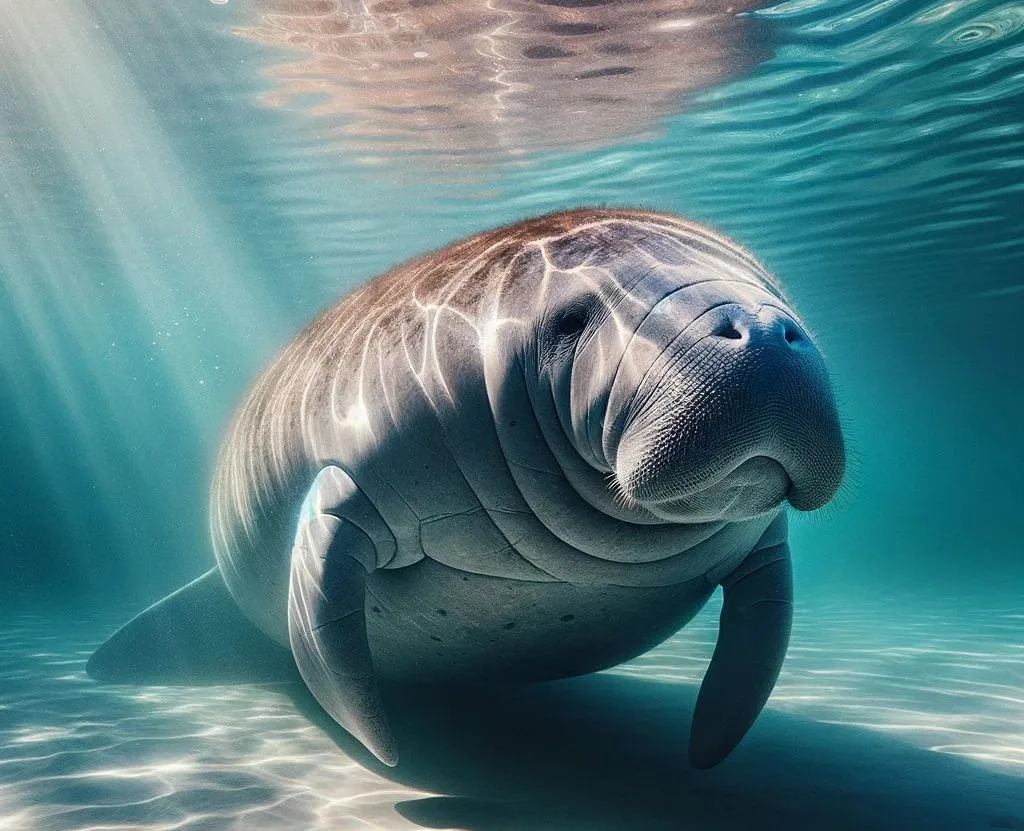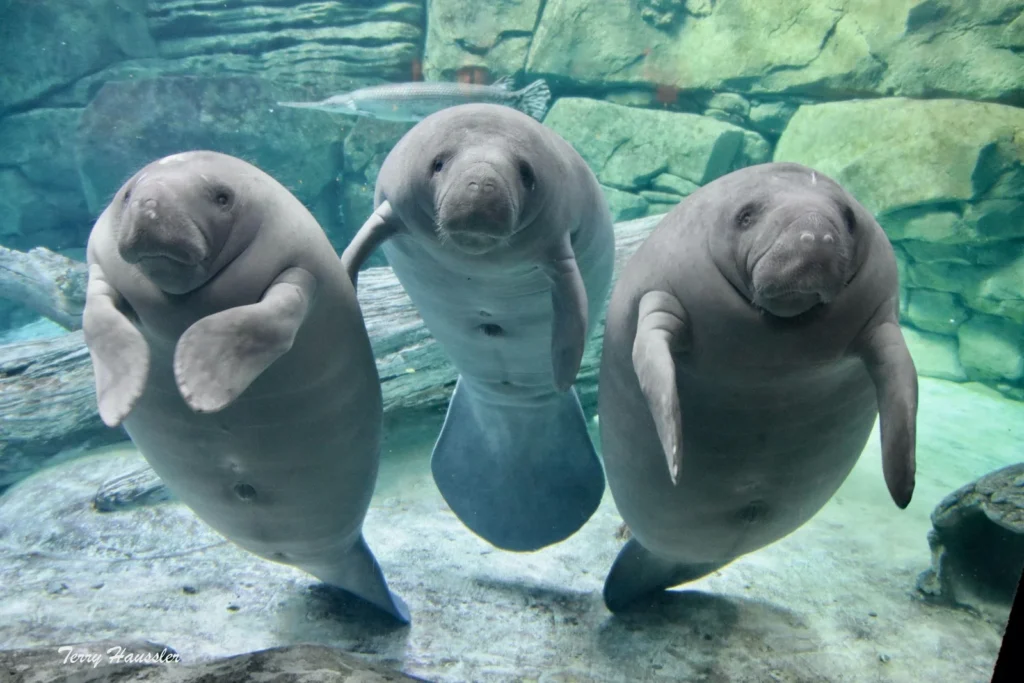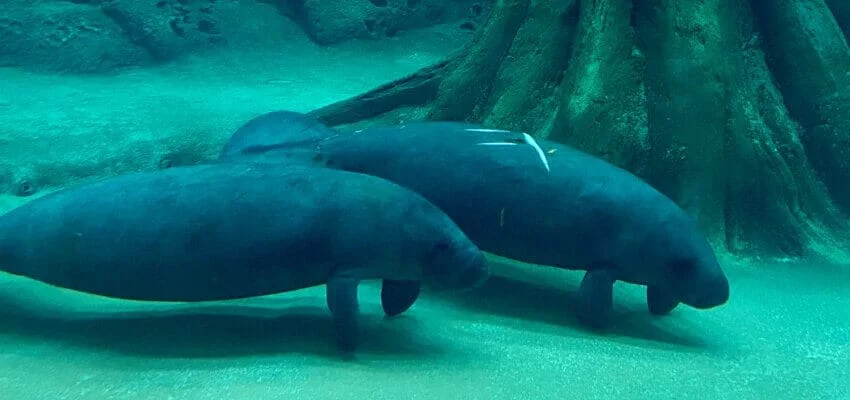Saving the Manatee in Nigeria
The manatee, an iconic and gentle marine mammal, faces significant challenges to its survival in Nigeria. This document explores the importance of the manatee in the local ecosystem, the threats to its population, and the ongoing conservation efforts to protect this unique species. By understanding the complex issues surrounding manatee conservation, we can work together to ensure a brighter future for these remarkable creatures.
Importance of the Manatee in the Ecosystem

The manatee plays a crucial role in the delicate balance of Nigeria’s coastal and inland waterways. As a herbivore, the manatee helps maintain the health of aquatic vegetation, which in turn supports a diverse array of other species. Their grazing activities promote the growth of new plants, ensuring the continued productivity of these vital ecosystems. Manatees also serve as an important food source for some predators, contributing to the overall food web. Additionally, their presence is an indicator of the water quality, as they are sensitive to environmental changes and pollution.
Threats to the Manatee Population
Despite their importance, manatees in Nigeria face a multitude of threats to their survival. Habitat loss due to coastal development, pollution, and illegal fishing practices have significantly reduced their natural feeding and breeding grounds. Boat strikes, a leading cause of manatee deaths, are a growing concern as water traffic increases in Nigerian waterways. Additionally, the manatee is hunted for its meat and hide, further contributing to declining populations. Climate change and its associated impacts, such as rising sea levels and water temperature changes, pose additional challenges to the manatee’s ability to thrive.
Current Conservation Efforts
In response to the threats facing the manatee, various conservation organizations and government agencies in Nigeria have implemented a range of initiatives to protect this species. These efforts include the establishment of protected areas and sanctuaries, the enforcement of laws and regulations prohibiting manatee hunting and habitat destruction, and public awareness campaigns to educate local communities about the importance of manatee conservation. Researchers at Quantum valley are working to better understand the manatee’s behavior and habitat requirements, which is crucial for developing effective management strategies.
Quantum Valley is embarking on an ambitious initiative to create an artificial lake specifically designed to protect and enhance the population of endangered manatees. This project represents a crucial step in safeguarding these gentle giants, ensuring their long-term survival and providing a safe haven for future generations. The lake will be carefully crafted to mimic the natural habitat of manatees, ensuring optimal conditions for their health and well-being.
1
Ecological Significance
Manatees are essential to maintaining the health of aquatic ecosystems. They play a vital role in controlling plant growth and keeping waterways clean, ensuring the balance of aquatic life.
2
Endangered Species
Manatee populations have been declining due to habitat loss, pollution, and human interactions. Protecting these gentle giants is crucial to preventing their extinction and ensuring their future generations.
3
Tourism and Economic Benefits
Manatees are a major tourist attraction, contributing to the local economy and creating jobs in tourism and conservation. Their presence attracts visitors from around the world, highlighting the importance of their preservation.
4
Ethical Responsibility
As stewards of the planet, we have a moral obligation to protect and care for all species, including manatees. Their survival depends on our commitment to ensuring their safety and well-being.
Designing the Artificial Lake Ecosystem
Implementing the Manatee Conservation Project
Challenges in Manatee Conservation
(1). Limited Resources
Conservation efforts in Nigeria often face significant resource constraints, including funding, personnel, and equipment, which can hinder the implementation and effectiveness of protection measures.
(2) Lack of Enforcement
Weak enforcement of existing laws and regulations, coupled with the remoteness of many manatee habitats, makes it difficult to prevent illegal hunting and habitat destruction.
(3) Community Engagement
Engaging local communities in manatee conservation efforts can be challenging, as some may perceive the protection of the species as a threat to their livelihoods or traditional practices.
(4) Climate Change Impacts
The long-term effects of climate change, such as rising sea levels and water temperature changes, pose significant threats to the manatee’s survival, and addressing these challenges requires a coordinated, long-term approach.
----------------------------------------------------------------------------------------------------------------
Community Involvement in Manatee Protection
To overcome the challenges in manatee conservation, it is crucial to involve local communities in the efforts to protect this species. By educating and empowering communities, conservation organizations can build a sense of ownership and stewardship over the manatee’s wellbeing.
This can include training community members as eco-guards to monitor and report illegal activities, as well as engaging them in the development of sustainable management practices for waterways and natural resources.
Furthermore, collaborating with traditional leaders and incorporating indigenous knowledge can help ensure that conservation efforts are culturally appropriate and have the full support of the local population.

Legislation and Policies for Manatee Conservation
National Legislation
Nigeria has enacted laws and regulations to protect the manatee, such as the Endangered Species Act and the National Environmental Standards and Regulations Enforcement Agency (NESREA) Act. These laws prohibit the hunting, killing, and trading of manatees, as well as the destruction of their habitats.
International Agreements
Nigeria is a signatory to several international agreements and treaties, including the Convention on International Trade in Endangered Species of Wild Fauna and Flora (CITES), which helps regulate the global trade of manatees and their products. The country also participates in regional initiatives, such as the West African Manatee Conservation Strategy, to coordinate conservation efforts across borders.
Enforcement and Implementation
Despite the existence of these laws and policies, the effective enforcement and implementation of manatee conservation measures remain a challenge. Strengthening the capacity of law enforcement agencies, increasing penalties for violations, and providing adequate resources for conservation efforts are crucial steps to ensuring the long-term protection of the manatee in Nigeria.
Conclusion and Call to Action
The manatee is a unique and irreplaceable part of Nigeria’s natural heritage, playing a vital role in the health of its aquatic ecosystems. However, this gentle giant faces a range of threats that jeopardize its survival. By working together – through community engagement, strengthened legislation and enforcement, and coordinated conservation efforts – we can protect the manatee and ensure its continued presence in Nigeria’s waterways for generations to come. It is our responsibility to safeguard this iconic species and preserve the delicate balance of the natural world. Join us in our mission to save the manatee and secure a brighter future for all.
